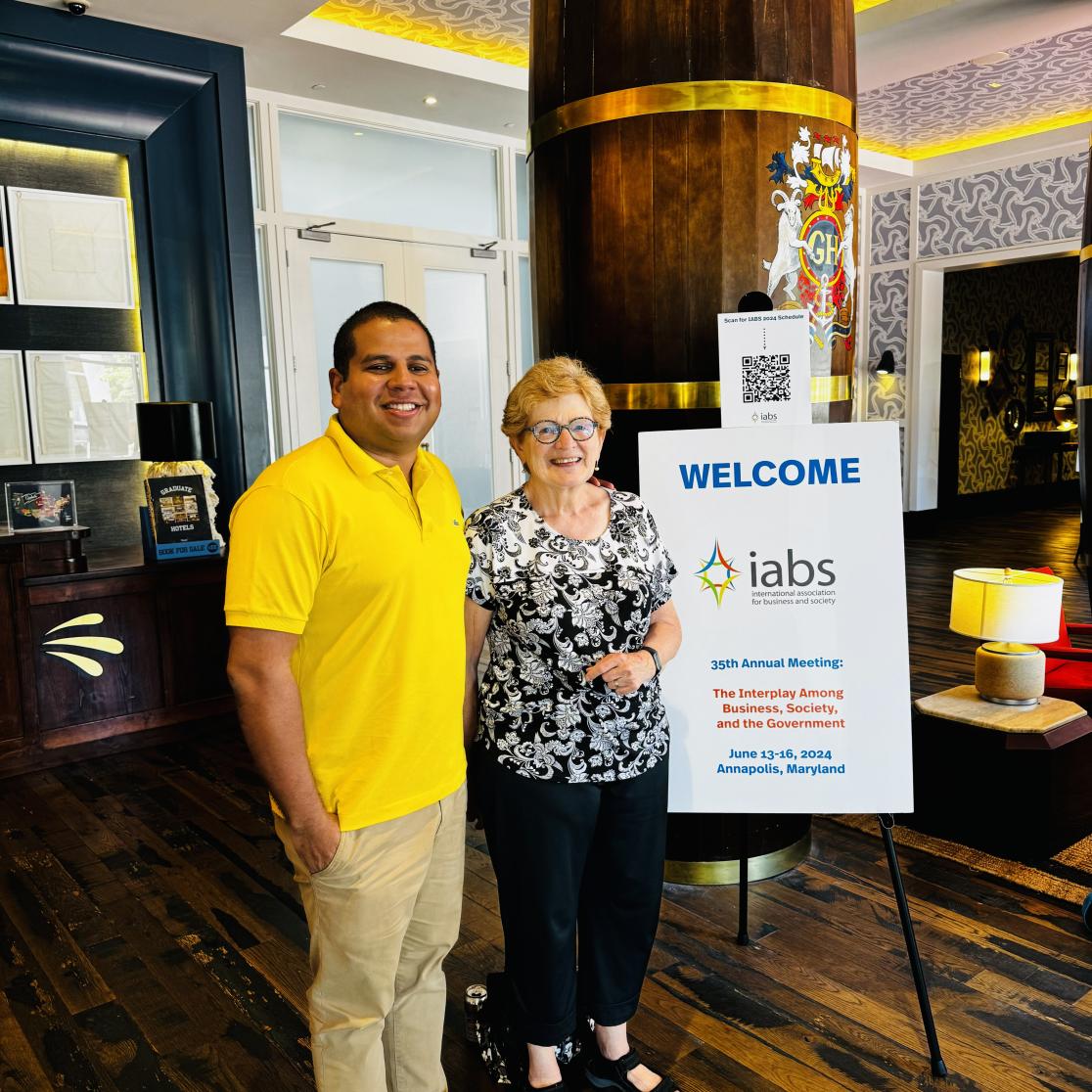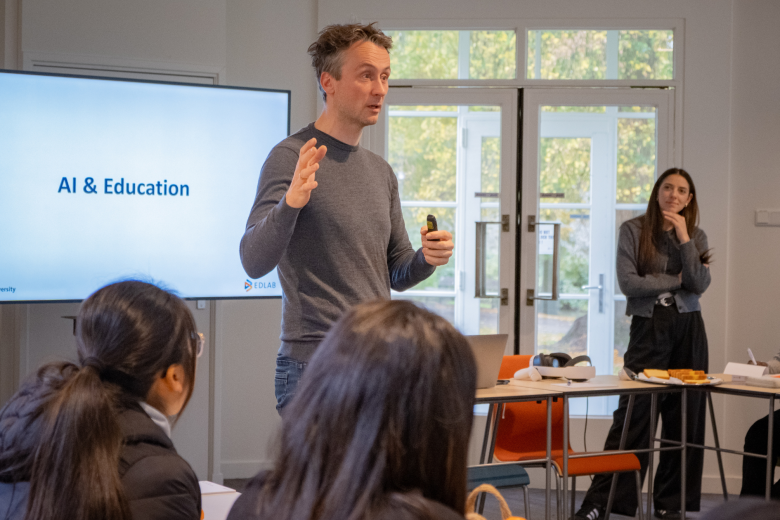Doing business by meeting societal needs
Abel Diaz Gonzalez on the challenges social entrepreneurs face, how he contributes to a supportive ecosystem for such entrepreneurs, how his students make him optimistic for the future and why UM gets to host the next IABS conference “Redesigning business for the common Good”.
“There’s a thin line between regular companies doing Corporate Social Responsibility well and social enterprises (SEs),” concedes Abel Diaz Gonzalez, Assistant Professor in the Department of Organization, Strategy and Entrepreneurship at SBE. “SEs operate to create positive social added value; it’s not something on the side; it’s the core goal of their business model.” SEs see business opportunities in solving or ameliorating existing problems. Combining a sense of altruism with the ability to spot the latent value in social or environmental issues and turning the solution into a viable business plan to deliver change, SEs sound like the perfect in-system solution to all our problems.
How social entrepreneurship is evolving
Of course, one could wonder why businesses having a positive impact – or at least not a negative one – is a droll niche in the market rather than the absolute minimum. But since we like cheap stuff and profit and there seems little appetite to reconsider, SE is the best bet we have. “Of course, none of the SEs are perfect – you can always do better. But I prefer something imperfect and evolving to nothing at all.”
Diaz also thinks the notion of the market as a cyclopic force for profit extraction is too cynical. “This century, you see a move towards people, planet, profit and peace. As people, consumers or workers, are more exposed to information, they are more prone to understanding the impact global supply chains behind consumer goods have on the environment, on the people involved, and ultimately on themselves and their loved ones.” Despite, or maybe because of his palpable optimism, his own research focuses on the “less romantic aspects of SE.”
What challenges do social entrepreneurs face?
“SEs face a lot of challenges, some of them different from other types of businesses. They tend to be small, at least to begin with, and they compete with big multinational companies which have a whole marketing machinery behind them. In my research work, I’m trying to understand what kind of supportive ecosystem SEs would need to operate, compete and thrive.” Challenges include funding, acquiring legitimacy, mission drift, business resilience as well as finding and retaining the right type of employees.
“The salary package is less impressive and a big part of the compensation for working for an SE is knowing that you’re making a positive impact. Often, the final pricing of products will be less competitive because you pay a premium for ethically and sustainably sourced goods.” But the biggest problem they face, according to Diaz, is a lack of awareness, not just of the individual SEs but of the concept as a whole. “These brands will not be in big department stores, which in turn influences how people make consumer choices. They are not a big name among graduates, they can’t run big ad campaigns, etc.”
Why impact measurement is crucial for social enterprises
The lack of visibility comes with a lack of funding opportunities. “Philanthropy is one way for SEs to get money, but there are also angel investors.” This problematically grandiose term refers to those willing to take a risk on start-ups or businesses that don’t promise immediate returns. “These investors, for example, large family funds, want to do good for society, they are looking for social return on investment.” Of course, it takes good impact measurement tools to verify this, since addressing a social issue is a key selling point. “If you want to convince consumers that you are legitimate you have to find a way to consistently measure your impact with the right tools. This is one of the things we study here at SBE.”
Measuring impact is crucial also to make sure you are having a positive impact, as the example of TOMS shows. “They had a ‘buy one – give one’ model, where they would sell shoes in the US and give shoes to people in the Global South. It was a great idea with a viable business model, and they were doing good. But if you’re only measuring how many shoes you’re gifting, you’re missing the point. It turned out that they were unintentionally damaging the shoe industry in the countries they were trying to help,” explains Diaz. “With the right measurement, they redesigned their business model: they cooperated with the shoemakers in those countries so they could build capacity there.”
TOMS has moved on from that model now. Bain Capital acquired 50% of the company a decade ago, either because of their positive impact or because the associated branding manages to sell basic espadrilles for €70. Now TOMS donate money to mental health charities, mostly in the US. In the Netherlands they give to Mind US, a charity that focuses on the mental health of young people. They offer, among other, things trainings for influencers. “SEs need to understand that the issues they want to address are likely very complex,” says Diaz, “and you need the right tools to understand the different layers, to understand consequences and to iterate your model.”
Why are we “Redesigning business for the common Good” at UM?
Diaz sincerely believes that, were people aware of the positive added social value of SEs – or by implication, the negative externalities of other companies – they would not only consume differently but also invest differently. After studying international relations and corporate communications, Diaz was working in “a nice job at a Colombian university, when in my late 20s, I asked myself ‘is this it?’” With a scholarship he studied management in Belgium, where his interest in SE originated. “I was invited to do a PhD at the chair of SE. The field work for my research on SE ecosystems eventually took me back to Latin America. I’ve been wanting to contribute to this development ever since.”
Diaz is delighted to be at UM. “At SBE, we have been offering courses on SE since 2012, which is very impressive if you compare it with other universities. There are now four courses in the portfolio, taken by 350 students per year. Most are from SBE, yes, but you see students from all faculties taking an interest.” The students he interacts with are much more aware than even his generation. “They are socially engaged and very conscious about their social and sustainable impact.”
There is a global community of scholars and activists around SEs and one of its focal points is the annual conference of the International Association for Business and Society (IABS). “I’ve been attending this conference every year since my PhD. The first time you come, you are received by one of the organisers. In my case that was Jeanne Logsdon and I’ll never forget how she welcomed me and told me that one day I would be the chair. So I was very emotional when I was eventually elected conference chair.” And for Diaz, it was immediately clear where he wanted to organise the event. Thus, Maastricht University’s School of Business and Economics will host the 36th annual conference of IABS on the theme “Redesigning business for the common Good”.
Text: Florian Raith

Abel Diaz and his IABS mentor Jeanne Logsdon. With Diaz as chair, the 2025 edition of the International Association for Business and Society' annual conference with the theme "Redesigning business for the common Good" will be hosted by the School of Business and Economics.
Also read
-
UWC Maastricht students get a taste of education innovation at EDLAB
On 21 October 2025, EDLAB hosted students from United World College Maastricht for the second year in a row, as part of their Youth Social Entrepreneurship programme.

-
Maastricht University ranked #3 worldwide and #1 in Europe in 2025 Better World MBA Ranking
We are incredibly proud to share that the MBA programmes of Maastricht University School of Business and Economics’ executive branches, MSM and UMIO, have once again been recognised among the very best sustainable business MBA programmes worldwide. In the 2025 Better World MBA Ranking by Corporate...

-
Young people in higher education mainly choose based on their interests. A better link with labour market opportunities is needed.
Against the backdrop of structural labour market shortages, it is of social importance that young people choose courses that not only match their interests and talents but also lead to occupations with good employment prospects and social value, particularly in sectors such as healthcare, education...
